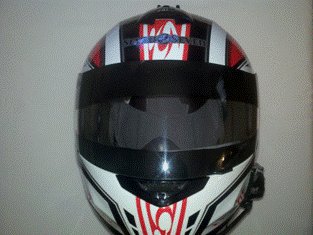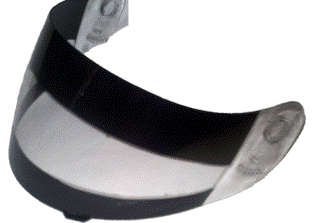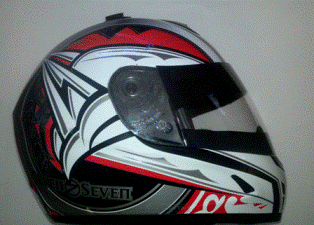|
Should You Wear a Motorcycle Helmet?If you don't want to wear a motorcycle helmet, there are twenty states and the District of Columbia that say otherwise, for you and your passenger. There are only three states that do not have any type of motorcycle helmet law. Illinois,(Illinois, really?) Iowa, and New Hampshire have absolutely no restrictions. The other twenty seven states have some type of related law from eye protection to helmets for children. Hey, I get it. Some people honestly believe the way to prevent loss of life or prevent serious injury is by passing laws. Although this sentiment is noble and I do understand the motivation, the logical end to that reasoning is to chain everybody to a tree.
When it comes to laws I'm kind of lawless. I mean lawless in spirit... they do punish you for breaking them. It's just that I'm not one who believes that the reason for government is to make laws. In fact I think a good candidate for political office is one who runs on the platform of "How many laws can I repeal?" Laws concerning motorcycle helmets are among these. Let's face it, unless you're working or under contract with a company and playing by their rules, who is someone to tell somebody else what they can or can't do? I mean really, who are you to force your belief system on me? If I'm not hurting anybody, leave me alone. At least in America we still have the right to choose for ourselves, although that right has been steadily eroding. (tobacco restrictions come to mind) I understand the argument about the expense of taking care of some unfortunate biker who smacked his unprotected melon on the concrete and is now brain dead. And, I've read the statistics about head injuries being leading cause of death in motorcycle accidents. But, it was his choice and he knew the risks. It's idiotic to presume that he didn't. Furthermore, we're freemen, not statistics! As for the costs, shouldn't we eliminate the socialistic system of freebies instead of Rights? (sorry for the rant, just my opinion) Having said all that, and making the argument for total freedom, I still choose to wear my brain bucket whenever I plan a road trip or just hop on. What? you say. Yep, I'm fully insured and responsible and I sure as heck won't be that guy on the ventilator because my head wasn't protected. In the past, when I was a reckless squirrely kid, (S.Q.U.I.D), Stupidly Quick Underdressed Iminently Dead) my helmet saved my life. After what could have been a much more serious accident, I inspected my helmet and found deep gashes right where my skull would have been without it. That's why I choose to wear. Case Closed. Every motorcycle helmet user has their particular type and style of helmet and there is a whole gamut of choices. If you choose to wear a helmet, or the law forces you to, remember these things. Never wear a helmet that's not DOT approved. That DOT sticker on the back is your guarantee that the helmet meets the minimum U.S. Department of Transportation standards for protection. A DOT sticker and a Snell sticker is even better. Make sure your helmet is sized to your head properly. Talk to your dealer personnel about proper fitting. Size your motorcycle helmet close to your hat size. It should be snug but not too tight. Put it on, grab it and move it up and down and side to side. If the fit is right you should feel your skin move with the helmet. In a full-faced helmet, close your mouth and bite down. There should be pressure felt on your cheeks against the padding. Make sure it will stay on your head. (Retention) This is very important if you're in an accident. For that matter, it's just as important while riding down the road. You don't want that thing flying off... Ever. Cinch down the chin strap till the motorcycle helmet is securely fastened. Now reach up over the top of the helmet and grab the bottom edge with your fingers and try to pull the helmet off your head. Be careful! You don't want to get too aggressive while pulling. The whole idea here is not to rip your head off or strangle yourself. It's to make sure the helmet will stay on and you will live if you're involved in a crash. I wear a full-faced motorcycle helmet for several reasons. First, I want the extra protection for my whole head and a face shield to protect against bugs and debris flying into my face/eyes.
Second, I love to listen to tunes and I've installed an intercom system with speakers on the inside. I can listen to my Mp3 player and GPS commands. I can also make and receive phone calls.
There's also something I learned when I worked as a motorcycle test rider. It involves the face shield. I'm sure you've been blinded by the sun at one time or another. Riding directly into a setting or rising sun is a huge risk. We used to put silver duct tape on the shield to act as a visor to block the sun. With a wide strip at the top you can tilt your head down to get your eyes out of the sun. A smaller strip along the bottom will allows you to flip up the visor and block the sun that way. What a great idea! The downside to having duct tape plastered all over your face shield is aesthetics. It simply looks terrible and makes you look like a hack. Over time, even duct tape comes off too. I made a paper template and masked off the center portion of the my screen and spray painted the exposed area. I thought this solution looked way better and worked great too. However, during a long trip I rode in some heavy rain a couple of times and the paint started chipping off. By the end of my trip, the paint was all gone from my face shield. Not such a good idea after all! So, I made things better! Solution: Paint the inside It was time for a new helmet anyway, so I purchased one and immediately removed the face shield. I took it to work and made a template out
of heavy material so I could media blast the areas before painting. With a nice rough texture, the paint adhered well and it still works fine today. At first the restricted view from inside was difficult to get used to, but after awhile I got over it and actually prefer this style over the original. To put on a shield without paint feels like my whole face is completely exposed. Well, actually it is. Disclaimer: Blocking any part of the view through your motorcycle helmet face shield is dangerous and I'm sure the manufacturer recommends against it.
My peripheral vision is almost the same since the paint is only on the top and bottom of the shield and not so much at the sides, but I do make it a point to look a harder before I change lanes. The top portion of the face shield lens is blacked out down 1 5/8" stopping 1" short of my forward field of view. The bottom is blacked out for 1" and doesn't block much of the view at all. That' my story and I'm sticking to it. Anyway, I don't want to cramp your style if wearing a motorcycle helmet is not for you. But, for me, it's an important part of planning a road trip, except for Helmet Hair. Motorcycle Helmet Facts: • Head injury is the leading cause of death in motorcycle crashes. (U.S. Department of Transportation/National Highway Traffic Safety Administration, State Legislative Fact Sheet) Return from Motorcycle Helmet to Motorcycle Gear |



